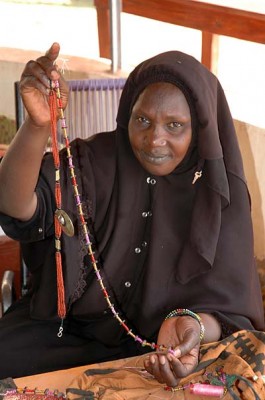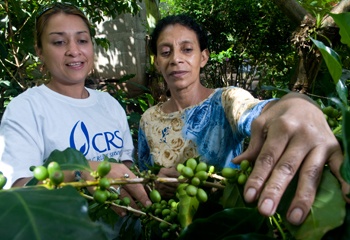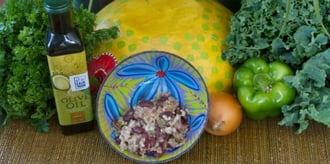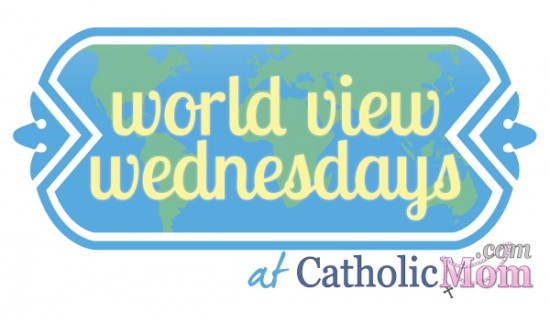As a part of our World View Wednesday series, I recently interviewed Stephanie Bosse, the program Coordinator for the work of Catholic Relief Services (CRS) in the Diocese of Orlando. Stephanie is also a CRS Fair Trade Ambassador. It's part of her role to coordinate CRS programs in Orlando (such as Rice Bowl, FoodFast, Catholics Confront Global Poverty, FairTrade and Helping Hands) and educate the community on the Church's role and beliefs about global poverty.
As a commissioned Fair Trade Ambassador, Stephanie offers a unique perspective on poverty issues in a way that challenges each of us to live out our gospel calling to “take care of the least of these.”
 Q: What is "Fair Trade" and why should it matter to Catholic families?
Q: What is "Fair Trade" and why should it matter to Catholic families?
At its most basic, fair trade is a way of ensuring that, whoever created a good that you purchase, receives a fair wage. I say this because, often when I share fair trade goods people say things to me like “I’ve heard fair trade things don’t taste good.”
Fair Trade isn’t a flavor! It’s simply a different way of purchasing something. Oddly though, that different way often makes us uncomfortable because when we understand fair trade we are faced with understanding things in a new way and taking responsibility for people we think we are unacquainted with. I often ask groups who in the room is wearing something made by a friend, by someone they love. Very few people raise their hands. I then ask them what the greatest commandment is. When they tell me that Jesus said, “to love the Lord our God above all else AND… to love your neighbor as yourself,” I pause for a second, and I ask the question about “who is wearing” again. Slowly, people begin to understand. We are AWARE of sweatshops. We know that goods from overseas are cheap. We understand this is because labor is “less expensive” “there”. But we have disconnected from the reality of what that means as Catholics – as people called to serve. Fair Trade, as I said earlier, often makes us uncomfortable because when we learn that most of our cacao is picked by children slaves in the Ivory Coast, when we see that there are millions of dollars being spent every day on lattes and cappuccinos but coffee farmers are STARVING, we have to rethink what how we buy things.
Recently Pope Francis said, “the (global) crisis will not be completely over until situations and living conditions are examined in terms of the human person and human dignity.” Fair trade allows us to look at the DIGNITY of people, to purchase items in mutual respect for what is created for us and what we enjoy. Truthfully, I realized rather recently, that as a child I spent a lot of time trying to figure out what Jesus looked like. I asked my Mom all the time. Jesus actually TOLD us what he looked like. He said, “I was hungry and you gave me food…thirsty and you gave me drink…in prison and you visited me.” This is His call to us, to take care of Him by taking care of those in His world who have less than we do. That is why Fair Trade should matter to all Catholic families. Plus, how much more Universal can we get than when we buy fair trade products.
 Q: What are some of the Fair Trade products which can be purchased?
Q: What are some of the Fair Trade products which can be purchased?
Well, fair trade has a HUGE variety of items we can buy. These include food goods like: chocolate, coffee, tea, sugar, bananas, other fruits and nuts, jams, soups and more. It also includes handcrafts, flowers, clothing, soccer balls and much more. CRS has a unique Fair Trade community in that we actually partner with 100% fair trade organizations and encourage Catholics to purchase through the CRS Fair Trade program. You can buy nearly all of the items listed above by going to www.crsfairtrade.org and shopping with any/all of our partners. Each of our partners puts a small percentage of any purchase into the “CRS Fair Trade Fund” and that fund is used to grow and start fair trade programs overseas and to provide fair trade education in the U.S.
Q: For some who may question why Fair Trade items cost so much more than what they can purchase in a discount store, can you please explain why paying extra for these products is in line with the teachings of our Church?
Well, in truth, the idea that fair trade items cost more isn’t necessarily correct. For instance, a pound of artisan roasted fairly traded hand picked, shade grown organic coffee is no more expensive than a pound of regular coffee from a large coffee chain. (And cup for cup it’s less expensive to brew at home than it is to purchase a single cup at one of those chains) Handcrafts and chocolate as well, may even be less expensive than there counterpart chocolates – and let me tell you, once you have tried fair trade, organic chocolate, that costs less than a designer bar containing wax and all types of ingredients you can’t pronounce, you’ll be hooked! All that being said, I believe sometimes, the perception is where the price is the issue. If you are throwing a $4 bar of chocolate in your cart at the grocery store you notice it less than if you are buying it at a Church sale, where your expectation is that kids are still selling $1 bars of chocolate.
Also, with handcrafts, people are so used to the bartering mentality that they believe the crafts SHOULD be “cheap”. These crafts are ALL handmade, they are just as beautiful as something made on a production line by hundreds of robots and are truthfully priced more than reasonably for the time put into their creation. However, again, most of the items are sold at church markets and bazaars and the idea/perception is that they will and should therefore be less expensive because they are less valuable. The perception of value comes because there is no designer label, no logo on them that we have decided, as a society, makes them worth their cost. This is exactly why, as Catholics, we should shop fair trade. What is valuable if not a human person who has painstakingly weaved a basket or carved a soapstone carving or whittled wood into a nativity in the Holy Land? I may not ever know that craftsperson’s name but surely, Jesus hopes that we value them.
 To go back to your original question about cost, it IS true that if a parish wants to switch to fair trade coffee it can be more expensive. The reason for this is multi-layered. Most parishes have contracts with coffee vendors that allows them “free” coffee – so any expense is, of course, extra. Second, parishes usually buy in bulk, and they buy the least expensive brands. These brands are from coffee companies that literally pay growers pennies per pound. Think about that, PENNIES PER POUND. This is not livable and while I never tell people to boycott, I do highly discourage anyone from buying the cheapest coffee available – it is ONLY cheap because people suffer. As Catholics we should never want that, in fact, as Catholics we should demand the marketplace make changes. (And that’s what fair trade does) I truly believe that if every parish in the United States knew the coffee story, knew who picks their beans, how hard that work is, what their life is like – that the few dollars it would cost to serve fair trade in the parish office and at our coffee and donut hour, wouldn’t even be a question, it would be a demand.
To go back to your original question about cost, it IS true that if a parish wants to switch to fair trade coffee it can be more expensive. The reason for this is multi-layered. Most parishes have contracts with coffee vendors that allows them “free” coffee – so any expense is, of course, extra. Second, parishes usually buy in bulk, and they buy the least expensive brands. These brands are from coffee companies that literally pay growers pennies per pound. Think about that, PENNIES PER POUND. This is not livable and while I never tell people to boycott, I do highly discourage anyone from buying the cheapest coffee available – it is ONLY cheap because people suffer. As Catholics we should never want that, in fact, as Catholics we should demand the marketplace make changes. (And that’s what fair trade does) I truly believe that if every parish in the United States knew the coffee story, knew who picks their beans, how hard that work is, what their life is like – that the few dollars it would cost to serve fair trade in the parish office and at our coffee and donut hour, wouldn’t even be a question, it would be a demand.
To go back to your original question. If you are able to buy fair trade at a discount store (I know for instance, that Costco has it as does Target and Sam’s) – then by all means, by fair trade there. Beyond that, discount stores are discounted for a reason – because the producers were paid so little that anything that store makes is a profit. As Catholics, we are called to take care of those with less, to help the poorest of the poor. Sadly, those discount stores do not take the livelihoods of people into their accounting. When Jesus told us what our personal accounting would be, he let us know exactly what he expected of us. I guess, we could all look at our lives as a ledger in some ways. Take a true accounting of our consumerism as a whole and see how Jesus would look at that. He wouldn’t look at our brand names or perhaps, even what we spend, but he WOULD look at whose expense our purchases came at. If our columns of buying include only lines of “purchased at the expense of others” are we living our gospel call?
Q: You offer a Community Orders program -- please tell us about this and how it can benefit parishes and organizations.
Our community orders program is brand new! Through our partner SERRV, we are offering 20% off of any community order purchases. This means, you get a group together, decide on the items you want to buy (or to sell) and you can use the 20% as a fundraiser (to buy your parishes coffee! To buy more chocolate to sell! To buy fair trade gifts for events! To pay for retreats or field trips!) Or you can just use it for discounted purchases for a sale you have. Community orders is a great tool for people to become more involved in fair trade and to share it with their community. Purchases over $300 receive free shipping.
[youtube_sc url=http://youtu.be/IY0WmppUShQ]
Q: Are there any additional thoughts or comments you'd like to share?
Poverty is a challenging thing to discuss. Most people think that if you feel hungry people their problems are solved. But feeding a hungry person doesn’t change their economic status. This is why, fair trade, to me, is the single most valuable tool we have when discussing poverty. Fair Trade tells the HUMAN story. Fair Trade shares with us the HOW and the WHY people live in poverty and it gives us HOPE to help people out of it. What could be more powerful than not only understanding why people live in poverty than learning tools as to how to change it? Also, the principles of Fair Trade (to be fair trade a community/cooperative must operate using these principles: Paying a fair wage in the local context, Offering employees opportunities for advancement, Providing equal employment opportunities for all people, particularly the most disadvantaged, Engaging in environmentally sustainable practices, Being open to public accountability, Building long-term trade relationships, Providing healthy and safe working conditions within the local context, Providing financial and technical assistance to producers whenever possible) allow communities of people to grow not just for a one item sale but for a lifetime! I have seen entire communities change because a fair trade cooperative was established and the city (not just the cooperative) opened a credit union. It’s amazing what fair trade can do and IS doing. Last of all, I am often asked to share fair trade in light of a Catholic social teaching principle. The beauty of fair trade is that I can’t choose! Fair Trade literally encompasses every principle: from the dignity of the human person, to the option for the poor – Fair Trade is LIVING OUR FAITH.
 Last, (oh my gosh, is she finished YET? Lol) – I’m not going to ever tell anyone fair trade buying is easy! I am terrible at clothing purchases (trying to be better and at least pray over items and the people who made them when I make a purchase) – and it’s fairly challenging to find fair trade clothing. (I do recommend it for youth groups and parishes though! You can find great t-shirts NOT made by kids which is a wonderful evangelization tool for your ministry) But back to my point, being a fair trader isn’t easy and my family isn’t perfect. We have committed to only drinking fair trade coffee and tea, which we have been pretty good at since 2007 and we try to only eat fair trade chocolate (but my husband can’t quite stop bringing those yummy chocolate/peanut butter cups into the house) – AND we are advocates. We regularly are part of petitions and letter campaigns to ask large corporations to start paying fair wages. And that advocacy is working! Major companies like Cadbury are becoming fair trade, Hershey’s is working on it and stores like Costco are making great ethical choices on their cocoa providers. As a Catholic, I am so proud to be a part of a movement that is making change!
Last, (oh my gosh, is she finished YET? Lol) – I’m not going to ever tell anyone fair trade buying is easy! I am terrible at clothing purchases (trying to be better and at least pray over items and the people who made them when I make a purchase) – and it’s fairly challenging to find fair trade clothing. (I do recommend it for youth groups and parishes though! You can find great t-shirts NOT made by kids which is a wonderful evangelization tool for your ministry) But back to my point, being a fair trader isn’t easy and my family isn’t perfect. We have committed to only drinking fair trade coffee and tea, which we have been pretty good at since 2007 and we try to only eat fair trade chocolate (but my husband can’t quite stop bringing those yummy chocolate/peanut butter cups into the house) – AND we are advocates. We regularly are part of petitions and letter campaigns to ask large corporations to start paying fair wages. And that advocacy is working! Major companies like Cadbury are becoming fair trade, Hershey’s is working on it and stores like Costco are making great ethical choices on their cocoa providers. As a Catholic, I am so proud to be a part of a movement that is making change!
CRS is holding it’s annual CRS Fair Trade Ambassador training this March. If any of your readers are already working in fair trade or doing the works of Global Poverty/social justice and are seriously interested in becoming a CRS Fair Trade Volunteer please have them contact me at sbossecrs@gmail.com.
Visit CRSFairTrade.org for more information
View our World View Wednesday archives
Copyright 2014 Lisa M. Hendey
About the Author

Lisa M. Hendey
Lisa M. Hendey is the founder of CatholicMom.com, a bestselling author and an international speaker. A frequent radio and television guest, Hendey travels internationally giving workshops on faith, family, and communications. Visit Lisa at LisaHendey.com, on her Substack at LisaHendey.Substack.com, or on social media @LisaHendey for information on her speaking schedule or to invite her to visit your group, parish, school or organization. Find Lisa’s books on her Amazon author page.



.png?width=1806&height=731&name=CatholicMom_hcfm_logo1_pos_871c_2728c%20(002).png)
Comments